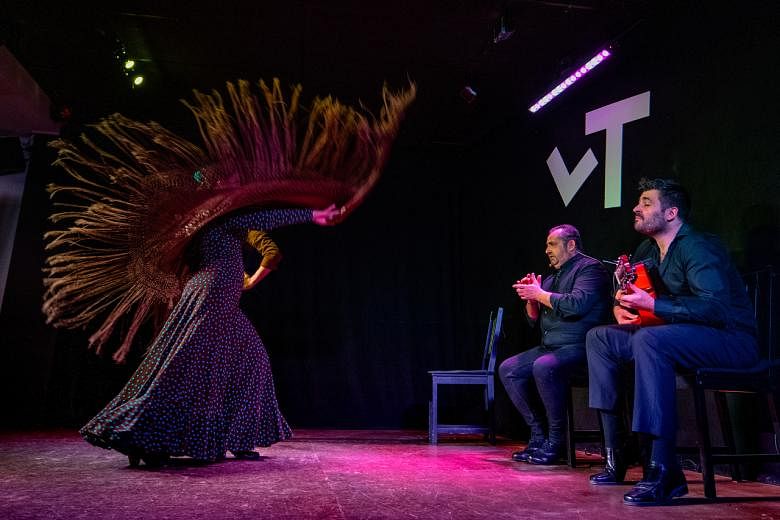MADRID (NYTIMES) - They are often in darkened, cave-like spaces, with a stage nestled among patrons' tables and chairs. These small clubs, called tablaos, have acted as a springboard for generations of flamenco artists in Spain to launch professional careers, much in the way that many jazz musicians first came to the public's attention in the clubs of cities like New Orleans.
But that intimate set-up, designed to pack the audience close to the stage, has left most tablaos unable to reopen even after Spain lifted its most severe pandemic lockdown restrictions. The situation has created an existential struggle for these cherished institutions at the heart of a national art form.
Mr Juan Manuel del Rey, president of the national association of tablaos, said that they "are now heading for extinction" if the government did not step in with more financial support.
"You cannot function economically when you have almost more employees and artists than spectators," he said.
While many theatres in Spain have reopened since last summer with reduced audience capacity, social distancing and other rules, that approach has been financially unviable for tablaos. Since the pandemic began, 34 of the national association's 93 tablaos have shut their doors for good, Mr del Rey said.
Their disappearance comes just as flamenco was enjoying one of its brightest moments, partly thanks to a tourism boom in Spain in recent years. Before the pandemic, foreign visitors flocked to the tablaos to discover a Spanish tradition that Unesco celebrates among the world's intangible cultural heritage.
After seven years of growth, the number of foreign visitors to Spain dropped to 19 million people last year, down from almost 84 million in 2019.
Spain's government gave a group of tablaos €232,000 (S$370,980) last year as part of more than €2 million that it put towards supporting the flamenco sector during the pandemic - a move that the culture ministry described in an e-mail as "an extraordinary effort".
But tablao managers say that the spate of recent closures shows that such support has been too little, too late.
In recent years, tablaos provided work for 95 per cent of Spain's flamenco artists, Mr del Rey said. And many artists say that they value the creative benefits of working in the informal venues, where they can test new ideas in front of an audience while working towards a larger production.
Performing in a tablao "is something very unique, because it is a place that allows me to reconnect with my inner feelings and share the emotions directly with the public", Mr Jesus Carmona, 35, who last year won Spain's prestigious national dance award, said in an interview.
Mr Carmona, who first performed in a tablao at age 10 and has since brought flamenco to many of the world's greatest stages.
This month, he danced in front of an audience of just 32 people in the Corral de la Moreria, one of Madrid's most famous flamenco clubs. The venue's director is Mr del Rey, the national association's president, and the club was founded by his father in the 1950s, when tablaos started to flourish in Madrid and other parts of Spain.
Although he hosted that one-off show for Mr Carmona, he has otherwise kept the establishment closed since March of last year. Mr Del Rey limited the audience size for the performance to a quarter of the 120 people the tablao could fit in before the pandemic, when it also used to hold two performances per night. Some overseas visitors have managed to make their way to the struggling tablaos despite pandemic restrictions.

At Las Tablas, German student Sabina Reiter attended her first flamenco performance last week alongside a British friend.
"I love all kinds of music and dancing, and it feels miraculous not only to be able to enjoy an evening out with my friend in Madrid, but also to discover flamenco up close rather than just on television," Ms Reiter said.
Yet the reality of the pandemic has been inescapable for many tablaos across Spain, including the famous Palacio del Flamenco of Barcelona, which recently closed its doors permanently.
In Madrid, the century-old Villa Rosa - whose colourful tiled walls were featured in movies by Pedro Almodovar and other Spanish directors) last month held a farewell outdoor performance, coupled with a protest rally, after which attendees placed flowers and candles at its entrance.
Such losses mean that Spain risks losing "the university of our flamenco", said Ms Rosana de Aza, a producer of flamenco shows, who has run tablaos in Seville and Madrid. "The tablao is really where our artists have been able to put into practice all that they have learnt and turn their passion into a profession."


